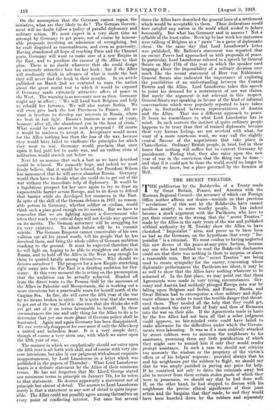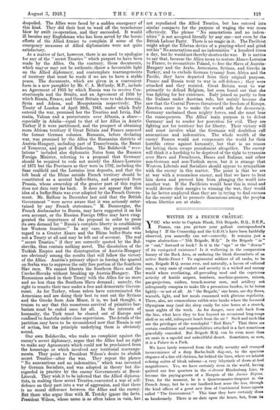THE SECRET TREATIES.
THE publication by the Bolsheviks of a Treaty made by Great Britain, France, and America with the Murman Regional Council—the accuracy of which cur Foreign Office neither affirms nor denies—reminds us that previous " revelations " of this sort by the Bolsheviks have caused needless anxiety to some worthy people. It has indeed become a stock argument with the Pacificists, who love to put their country in the wrong, that the " secret Treaties " made by the Allies in the early years of the war and published without authority by M. Trotsky show the Allies to have cherished " Imperialist " aims, and prove us to have been as bad as the Germans, on the hypothesis that every " " is a criminal. We must confess to having neglected this new device of the peace-at-any-price faction, because any one who had troubled to read the Bolshevik disclosures could see that there was nothing in them to surprise or alarm a reasonable man. But as the " secret Treaties " are being used to create sympathy for the enemy, concerning whose diplomatic performances the Pacificists are silent, it may be as well to show that the Allies have nothing whatever to be ashamed of. In the first place, we may point out that theso Agreements were made in very trying circumstances. Ger- many and Austria had suddenly plunged Europe into war by falling upon Belgium and Serbia, and France, Russia, and Great Britain had to extemporize a close military and diplo- matic alliance in order to meet the terrible danger that threat- ened them. They needed all the help that they could get, and welcomed the entry first of Italy and then of Rumania into the war on their side. If the Agreements made in haste by the five Allies had not been all that a sober judgment could approve, no fair-minded critic could have failed to make allowance for the difficulties under which the Govern- ments were labouring. It was as if a man suddenly attacked by street robbers were to summon the neighbours to his assistance, promising them any little gratification of which they might care to remind him if only they would render prompt assistance. In such a case we should not criticize too narrowly the wisdom or the propriety of the victim's offers or of his helpers' requests ; provided always that he and his neighbours put the robbers to flight, we should say that he was amply justified in paying any price for help. If he contrived not only to drive the criminals away but also to recover from them certain stolen goods of which they were in possession, we should say that he had done well. If, on the other hand, he had stopped to discuss with his neighbours the precise ethical significance of their joint action and the bargains that they made, he and they would have been knocked down by the robbers and separately despoiled. The Allies were faced by a sudden emergency of this kind. They did their best to ward off the treacherous blow by swift co-operation, and they succeeded. It would ill become any Englishman who has been saved by the heroic efforts of the Allied Armies to complain if some of the emergency measures of Allied diplomatists were not quite satisfactory.
As a matter of fact, however, there is no need to apologize for any of the " secret Treaties " which purport to have been made by the Allies. On the contrary, these documents, which may or may not be authentic, throw a favourable light on the Allied diplomacy, and contemplate rearrangements of territory that must be made if we are to have a stable peace. The documents, which are given in a convenient form in a new pamphlet by Mr. C. A. McCurdy, M.P., include an Agreement of 1915 by which Russia was to receive Con- stantinople and the Straits, and an Agreement of 1916 by which Russia, France, and Great Britain were to take Armenia, Syria and Adana, and Mesopotamia respectively. The Treaty of London of April 26th, 1915, under which Italy entered the war, promised her the Trentino and Istria, Dal- matia, Valona and a protectorate over Albania, a share— especially in Adalia--equal to that of her Allies in Asiatic Turkey if it were partitioned, and the prospect of obtaining more African territory if Great Britain and France annexed the former German colonies. Rumania, before declaring war, was promised by the Allies the Rumanian districts of Austria-Hungary, including part of Transylvania, the Banat of Temesvar, and part of c'Bukovina. The Bolshevik " reve- lations " included also diplomatic Notes from the Russian Foreign Minister, referring to a proposal that Germany should be required to cede not merely the Alsace-Lorraine of 1871 but the Provinces as they were in 1792, including the Saar coalfield and the Lorraine iron deposits, and that the left bank of the Rhine outside French territory should be constituted as a neutral buffer-State, and separated from Prussia, whose ownership of the greater part of this region does not date very far back. It does not appear that this idea of a buffer-State was ever adopted by the French Govern- ment. Mr. Balfour in December last said that the British Government " were never aware that it was seriously enter- tained by any French statesman." M. Doumergue, the French Ambassador to Russia, may have suggested it on his own account, or the Russian Foreign Office may have exag- gerated the importance of the proposal in order to press its own demand for " Russia's complete liberty in establishing her Western frontiers." In any case, the proposal with regard to a Greater Alsace and the Rhine buffer-State was not a Treaty at all and may be left out of account. The real " secret Treaties," if they are correctly quoted by the Bol- sheviks, thus contain nothing novel. The dissolution of the Turkish Empire and the disintegration of Austria-Hungary are obviously among the results that will follow the victory of the Allies. Austria's primary object in forcing the quarrel on Serbia was to suppress the only free portion of the Southern Slav race. We cannot liberate the Southern Slays and the Czecho-Slovaks, without breaking up Austria-Hungary. The Rumanians asked in their Treaty with the Allies for no more and no less than the Southern Slays demand ; namely, the right to reunite their race under a free and democratic Govern- ment. As for Turkey, whose rulers have exterminated the Armenians and are doing their best to root out the Syrians and the Greeks from Asia Minor, it is, we had thought, a truism to say that this monstrous survival of primitive bar- barism must be ended once for all. In the interests of humanity, the Turk must be cleared out of Europe and confined to Anatolia under close supervision. The details of the partition may have to be reconsidered now that Russia is out of action, but the principle underlying them is obviously sound.
Our own Bolsheviks, who make no complaint against the enemy's secret diplomacy, argue that the Allies had no right to make any Agreements which could not be proclaimed from the housetops or which involved any territorial rearrange- ments. They point to President Wilson's desire to abolish secret Treaties—after the war. They repeat the phrase " No annexations and no indemnities," which was invented by German Socialists, and was adopted in theory but dis- regarded in practice by the enemy Governments at Brest- Litovsk. They wish it to be inferred that the Allied diploma- tists, in making these secret Treaties, converted a war of self- defence on their part into a war of aggression, and that there is no moral difference between the Allies and the enemy. But those who argue thus with M. Trotsky ignore the facts. President Wilson, whose name is so often taken in vain, has not repudiated the Allied Treaties, but has entered into similar compacts for the purpose of waging the war more effectively. The phrase " No annexations and no indem- nities " is not accepted literally by any one—not even by the British Labour Party. There is no magic in it. The Pacificist might adopt the Tibetan device of a praying-wheel and grind out his " No annexations and no indemnities " a hundred times a day, but he would not thereby shorten the war. It is untrue to say that, because the Allies mean to restore Alsace-Lorraine to France, to reconstitute Poland, to free the Slays of Austria- Hungary and the Arabs, Armenians, Syrians, and Greeks in Turkey, and to exclude German tyranny from Africa and the Pacific, they have departed from their original purpose. France and Russia went to war in self-defence ; they were attacked and they resisted. Great Britain went to war primarily to defend Belgium, but soon found out that she was fighting for her existence. Italy joined us partly to free the Italians under Austrian rule, but mainly because she saw that the Central Powers threatened the freedom of Europe. America came in to make the world safe for democracy. Germany unchained these mighty forces, and she must bear the consequences. The Allies' main purpose is to defeat Germany and to render her powerless for evil. They are fighting not for territory but for liberty. Their victory will and must involve what the Germans will doubtless call annexations and indemnities. The whole wealth of the enemy Powers would not compensate the world for their horrible crime against humanity, but that is no reason for letting them escape punishment altogether. The enemy will think it a hardship to be deprived of the right to tyrannize over Slays and Frenchmen, Danes and Italians, and other non-German and non-Turkish races, but it is strange that Western Liberals and Socialists should appear to sympathize with the enemy in this matter. The point is that we are at war with a remorseless enemy, and that we have to beat him down and prevent him from plunging the world into another war. If the Pacificists would bear this in mind and would devote their energies to winning the war, they would be far better employed than they are in trying to find excuses for the enemy and to promote dissensions among the peoples whose liberties are at stake.



























 Previous page
Previous page